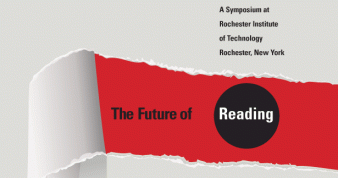Future of Reading Symposium

June 2010
Lectures available on YouTube in the Future of Reading 2010 playlist:
Johanna Drucker, "Frame Jumps and Mixed Modalities," June 10, 2010.
Chris Anderson, "Tablets and the Future of Media," June 10, 2010.
Amit Ray, "Decoding Babel: Emerging Dimensions of Language, Power, and Translation on Wikipedia," June 10, 2010.
Molly Barton, "Amplification v. Distraction: Penguin's Ventures Beyond the Book and Past the Page," June 10, 2010.
Richard Lanham, "A Multimedia Incunabulum," June 11, 2010.
Jon Orwant, "Google Books," June 11, 2010.
N. Katherine Hayles, "Hyper Reading: Pattern v. Meaning," June 11, 2010
Jane Friedman, "Changes in Publishing," June 11, 2010.
Kris Holmes, "The Radical Hand," June 12, 2010.
Dennis Tedlock, "Sound and Image in Mayan Writing," June 12, 2010
Denis Pelli, "The Role of Vision in Reading," June 12, 2010.
Robert Bringhurst, "What is Reading For?" June 12, 2010.
The RIT School of Print Media and RIT Cary Graphic Arts Press presented: “The Future of Reading: Provocations, Predictions, Possibilities,” June 9-12, 2010. The symposium was organized by Charles Bigelow, Patricia Sorce, David Pankow, Amit Ray, and Amelia Hugill-Fontanel.
This three-day symposium at RIT was organized around a central question: How will reading change in the next decade? With a target audience of 300-500 participants, the conference featured provocative and challenging presentations by experts in writing systems, content creation, vision and cognition, typography, visual media, and display technology.
No learned process is more firmly embedded in our culture as an agent of information transfer than reading, yet its subtle pleasures and necessary disciplines seem overwhelmed by today's sustained orgasm of visual media. Many modern readers participate enthusiastically in the democracy of publishing, but have little patience for extended excursions into long narrative texts. If current trends prevail, we will increasingly read as though our destination must always be within easy sight and instant comprehension. A challenging literary journey to a distant shore is not supported in an information economy driven by short attention and immediate reward. Will literacy based on brief exchanges spell the end of traditional reading? Should we be concerned if it does? What might replace reading?
Evolving technologies and habits of information exchange have profound effects on how societies (their thinkers, writers, scientists, and citizens) envision, create, articulate, distribute, absorb, remember, and assimilate content. Commercial competition and technical innovation, as well as the perpetual desire to create and share, are reshaping the information systems on which reading depends: the private act of writing, the interpretive act of typography, and the social act of publishing.
The aim of this conference was to foresee where and how new modes of reading will take us-socially, politically, economically and aesthetically in the coming decade. There were three main themes:
Theme 1: Reading & Writing
Often in its history, reading has undergone major shifts in technology, culture and cognition, with profound consequences for society. The advent of printing with movable type brought a many-fold increase in the supply of books, while rising numbers of people with time and money to spend on reading were associated with increasing commerce, improved transportation, accelerated urbanization, and challenges to ecclesiastical and civil authority. Stabilization and promulgation of vernaculars through print contributed to the rise of national literatures as well as nationalism and nation-states.
Currently, modern society is experiencing a radical shift in reading technology and literate behavior, which may likewise have deep social, cultural and political repercussions. Compared to the first era of print, today's media universe is more varied in form and content. Rich media environments saturate the life-worlds of consumers in post-industrial and developing societies alike. Reading has become a variegated activity, occurring in environments previously unlikely to be devoted to text, and in contexts where technologically mediated social interaction has unprecedented breadth and scope.
Theme 2: Media & Technology
Digital technology is transforming reading. From the network-distribution model of the web to the proliferation of dedicated reading devices, new texts today are increasingly distributed and consumed in digital form. The convenience of near-instantaneous access to text and image on-line is confronted by the overwhelming volume of information available in cyber-space. Older, familiar spatial relationships between reader and text are compromised, or enhanced, by new environments in which little effort is needed to feed the reading experience. The speakers in this theme addressed multi-platform publishing to different devices, reading efficiencies, text parsing for custom audiences, the transformation of information from static marks on tangible substrates to dynamic, multimedia hypertexts in cyberspace, the importance (or irrelevance) of variable carriers for texts, the relationship between reader and device, and the philosophies of representing the human experience in a society evolving toward a fully networked meta-universe.
Theme 3: Science & Art of Literacy
From imposing inscriptions in the Roman forum, to dazzling illuminated manuscripts of the middle ages, to masterpieces of Renaissance printing, to myriad variations of modern typography in print and on computer screens, the creation of letter forms and their arrangement into text is a subtle art with a practical goal—the transmission of knowledge. Calligraphers, typographers, type designers, graphic designers, and book artists have long known the aesthetic principles that make texts pleasurable as well as legible, but only in recent years have scientists begun to understand how abstract graphical letter shapes are processed by our eyes and brain into linguistic messages, while linguists have analyzed the structures of writing systems and the literary texts arising from writing. The future of reading will draw from these three parallel streams of knowledge, the scientific, the artistic, and the linguistic, to shape the visual texts of tomorrow.











